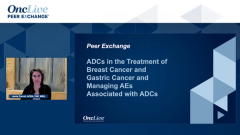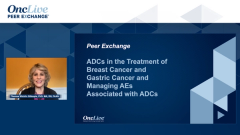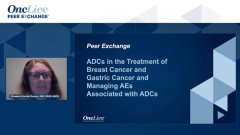
Role of the Broader Healthcare Team in Managing AEs Associated With T-DXd
Panelists share their perspective on the role of the broader, multidisciplinary healthcare team in managing toxicity associated with trastuzumab deruxtecan therapy.
Episodes in this series

Transcript:
Sarah Donahue, MPH, NP, AOCNP: How does your broader health care team, where you practice, participate in the management of these toxicities in patients with trastuzumab deruxtecan in metastatic gastric cancer. Theresa?
Theresa Wicklin Gillespie, PhD, MA, RN, FAAN: We do have very good pharmacy support. We have Pharm Ds [doctors of pharmacy] that are part of the team. And if the regimen that Liz Elizabeth Prechtel Dunphy, DNP, CRNP, AOCN went over, perhaps, is not effective in a particular patient, or they have some other things going on, that input may be very valuable. And then, absolutely, nutritional support. We have dietitians who are very engaged with these patients and their families in terms of helping them to work through these nutritional issues. And so they would be, I would say, top of the list in terms of the broader health care providers who would need to be involved with these patients.
Jamie Carroll, APRN, CNP, MSN: I definitely agree. We have clinical pharmacists on our care teams. Our clinical RNs [registered nurses] obviously play a pivotal role in talking with patients about toxicities. They do our education prior to the patient starting a new therapy. They’re that frontline when a patient messages into the care team. So the nurses do a lot of our toxicity management for our patients.
Sarah Donahue, MPH, NP, AOCNP: We have a similar setup where we are. We call them our triage nurses that are the first line in hearing about changes in bowel movements.
Transcript edited for clarity.
Newsletter
Knowledge is power. Don’t miss the most recent breakthroughs in cancer care.



































































































